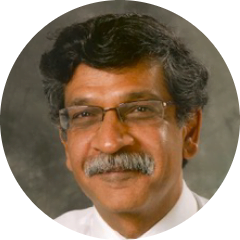Covid 19 – Neurological complications
Hadi Manji, Associate Professor at University College, London, UK
There was an inkling, because of the previous experience with the SARS and MERS pandemics, that SARS -CoV- 19 could cause neurological complications. The first reports from Wuhan, China in April 2020, documented neurological symptoms and syndromes in 36% of inpatients. However, it was not clear from those early reports, if these neurological complications were a result of the virus itself or were due to the complications of sepsis, hypoxia, metabolic derangements or drugs and interventions such as ventilation and ECMO (extracorporeal membrane oxygenation) used in these, often critically ill patients, on the Intensive Care Units.
Subsequently, in acute COVID infection, although relatively rare (but with potentially devastating long-term sequelae given the number of individuals infected with the virus) the following syndromes have been associated – encephalopathy, inflammatory disorders including ADEM, encephalitis, opsoclonus/myoclonus or brain stem syndromes, large multi vessel strokes, neuropsychiatric disorders (psychosis, depression and anxiety). Several movement disorders have also been described including myoclonus (the commonest), and also Parkinsonism. The association of Guillain-Barre Syndrome and COVID -19 is, to date, still controversial. Some studies have also described a persistent low-grade myositis.
In my lecture, these neurological presentations will be described in more detail with examples and attempts at elucidating the underlying mechanisms (such as endothelialitis, thrombophilia, and cytokine storms) and hence treatment options.
Neuropathological studies have detected the SARS-CoV2 virus in the brain, albeit at low levels. Inflammatory changes with microglial activation, microglial nodules and T cell activation were found in the brain stem and cerebellum.
It has also become clear that after acute COVID infection, whether mild or severe, a significant proportion will develop what is now called Long COVID. The commonest symptoms include headache, brain fog, fatigue, myalgia and autonomic symptoms, The underlying mechanisms have yet to be identified and treatment is at present symptomatic only. In this lecture, I will describe our experience at Queen Square since we have had to set up a special Long COVID Neurology clinic to address the demand.
References:
- W. Paterson, R.L. Brown, L. Benjamin, et al., The emerging spectrum of COVID- 19 neurology: clinical, radiological and laboratory findings, Brain. (2021), https:// doi.org/10.1093/brain/awaa240.
- Jesuthasan, F. Massey, H.Manji, M.Zandi, S.Wieethoff. Emerging potential mechanisms and predispositions to the neurological manifestations of COVID-19. J Neurol Sci. https://doi.org/10.1016/j.jns.2021.117608
- T. Thakur, E.H. Miller, M.D. Glendinning, et al., COVID-19 neuropathology at Columbia University Irving Medical Center/New York Presbyterian Hospital, Brain (2021) awab148, https://doi.org/10.1093/brain/awab148.
- Keddie, J. Pakpoor, C. Mousele, et al., Epidemiological and cohort study finds no association between COVID-19 and Guillain-Barre syndrome, medRxiv (2020) Published online July 24. 2020.07.24.20161471, https://doi.org/10.1101/2020. 07.24.20161471.
- Goërtz YMJ, Van Herck M, Delbressine JM, et al. Persistent symptoms 3 months after a SARS-CoV-2 infection: the post-COVID-19 syndrome?. ERJ Open Res 2020; 6: 00542-2020 [https://doi.org/10.1183/23120541.00542-2020].
Short Bio
Dr Hadi Manji was appointed Consultant Neurologist at the National Hospital, Queen Square London in 1997. In 2022, he was appointed Associate Professor at University College, London.
He studied medicine at Trinity Hall, Cambridge and the Middlesex Hospital. After qualification in 1982, he trained as a General Practitioner and subsequently in Neurology at the National Hospital and Hospital Kremlin Bicetre, Paris.
His specialist interest is in Neuro-infections (including HIV, Tropical Disorders and now Covid-19) as well as Peripheral Nerve disorders. He is part of the MRC Centre for Neuromuscular Diseases at the National Hospital.
In 2018, he set up a monthly “Encephalitis: infection and immunological” MDT which had to be upgraded from monthly to a weekly virtual meeting because of the increasing number of referred cases related to COVID 19.
Dr Manji was President of the Neurosciences Section of the Royal Society of Medicine in 2019/2020.
He is Chairman of the Medical Committee at Queen Square.
Other interests include teaching – he has taught and lectured in Kenya, Mozambique, Nigeria and India.
He is Senior author and editor of the Oxford Handbook of Medicine (3rd edition now in preparation).

